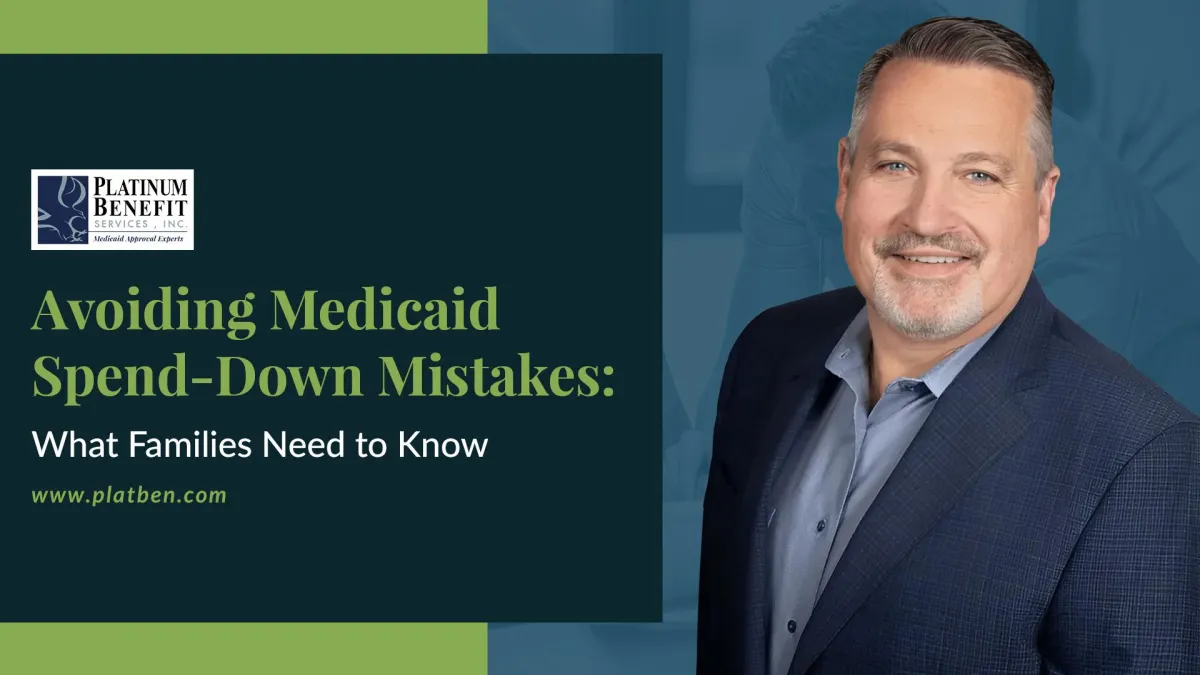
Avoid Medicaid Spend Down Mistakes: Save Assets & Avoid Penalties
Medicaid spend down is one of the most misunderstood parts of qualifying for long-term care benefits. Antony Turbeville explains that “spending down” can be viewed two ways—negatively or positively. Nursing homes often encourage families to simply pay their bills until all assets are depleted. For example, if a person has $140,000 in savings and the nursing home costs $14,000 a month, they’re told to spend everything on care until the money is gone, then apply for Medicaid. This approach leaves nothing for the family.
However, there is another way to view a Medicaid spend down—strategically converting countable assets into non-countable ones. By shifting money into exempt categories that still hold value for the family, it’s possible to qualify for Medicaid while protecting savings.
Common Medicaid Spend Down Mistakes Families Make
Antony highlights some of the most common mistakes families make when trying to reduce assets. One major error is transferring money directly from a parent’s account to a child’s account. Medicaid reviews all financial activity during the five-year look-back period and asks if any money was gifted. If the answer is yes, they impose a penalty period delaying Medicaid eligibility.
Another mistake is rushing to purchase big-ticket items like a new car. While buying a vehicle is technically allowed, it’s often not the smartest financial move because it’s a depreciating asset. Families sometimes act with good intentions but lack proper guidance, leading to unnecessary complications.
Even small acts of generosity can create problems. As people age, they often become more giving, but Medicaid considers any gifts made within five years as an attempt to qualify for benefits—even if the gifts weren’t made for that reason. Proving otherwise is nearly impossible since the determination is subjective.
How to Fix Past Gifts and Transfers
When a person gifts money to children or grandchildren and later needs Medicaid, the state may impose a penalty period. For example, if a parent gives away $50,000 each to three children and later requires nursing home care, Medicaid could penalize them for more than a year.
In many cases, the children have already spent the money, so they cannot return it. However, there are ways to “fix” the gift. One strategy is for the children to sign promissory notes, legally acknowledging the money as a loan. Properly worded promissory notes can satisfy Medicaid and reverse the penalty. Once the gift is fixed, additional planning can protect those assets from being counted.
Safe Ways to Reduce Countable Assets Without Penalties
Antony explains that there are over 30 different strategies to safely reduce assets. Some of the simplest include:
Prepaying funeral plans for yourself and even extended family members. Medicaid allows prepaid burial expenses for spouses, children, and even loosely related relatives.
Purchasing vehicles strategically. A family can own one vehicle of any age or value, plus additional vehicles over seven years old. This allows for creative ways to shift cash without losing its value.
Buying into another person’s home on paper. By transferring money in exchange for a percentage interest in a child’s home, the funds become non-countable. That percentage of ownership can later be offered for sale, which realistically no one will buy.
More complex strategies involve promissory notes, which can be structured to count as either income or assets depending on how they’re written. For example, an income promissory note must have equal payments, be non-cancelable, non-transferable, and actuarially sound—meaning it must pay back over the person’s life expectancy. These tools buy time and protect assets legally.
Why Personal Services Contracts Are Risky
Personal services contracts are a commonly recommended tool, but Antony warns they can create unintended tax problems. These contracts allow a child to be paid in advance for caregiving services over the rest of a parent’s life. While it seems like an easy solution, the lump-sum payment creates taxable self-employment income for the recipient.
For example, if a child is paid $100,000 under a personal services contract, they would owe self-employment taxes and potentially up to 40% in combined taxes. Many families fail to report the income, leading to serious tax risks. Antony advises exploring other strategies before resorting to personal services contracts.
How Professionals Help Families Avoid Costly Mistakes
Working with experienced Medicaid planning professionals saves families time, stress, and money. Antony explains that Platinum does not give legal advice but educates families on every possible strategy to achieve Medicaid eligibility. They work alongside trusted attorneys to determine the best legal path while handling all the administrative work.
Unlike most attorneys, who hand clients a list of required documents, Platinum proactively contacts financial institutions, gathers verifications, and fixes mistakes that may have already been made. They focus on achieving three key goals:
Liquidity – Ensuring the family retains cash instead of locking it into illiquid assets like real estate.
Control – Allowing families to maintain control over assets rather than losing access.
Zero tax liability – Structuring strategies to avoid triggering unnecessary taxes.
A good Medicaid plan should accomplish all three whenever possible.
Why DIY Medicaid Applications Can Backfire
Many families try to handle Medicaid applications themselves, but Antony warns this can lead to costly delays and denials. Even if the application is submitted correctly, Medicaid runs an income and asset verification system report before approval. This report scans banks and insurance companies for undisclosed accounts or transfers. If Medicaid finds anything questionable, they assume it was handled incorrectly unless the family can prove otherwise.
If an application is denied, families cannot retroactively recover benefits for the months lost. This can amount to tens of thousands of dollars in nursing home costs that Medicaid would have otherwise covered.
The Best Advice for Families Helping a Parent Qualify
Antony ’s top advice is simple: work with someone who truly understands Medicaid rules. Trying to handle it alone is like trying to fix a car without the proper tools or knowledge—it takes longer, costs more, and often creates more problems.
The right professional can legally protect nearly all assets, even in a crisis situation, while avoiding penalties, taxes, and unnecessary complications.


